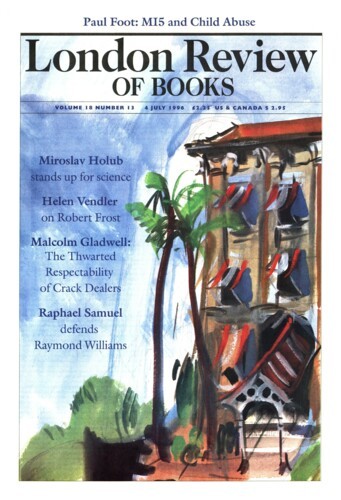Lousy Fathers
Malcolm Gladwell, 4 July 1996
Once, three years ago, I had lunch in Harlem with a crack dealer. The date was set up by an anthropologist who was studying the inner-city drug trade. She promised me that after the three of us had eaten, the dealer would show me around his turf in central Harlem. At the time, I remember thinking that her promise sounded odd. I couldn’t imagine that a crack dealer – particularly someone who was as much of a big-timer as this man apparently was – could find room in his schedule for a leisurely stroll around the crack dens of upper Manhattan. Thinking back on all the cop shows and police movies about cocaine kingpins that I had seen, I imagined that he would have to run off for a big meeting with some Colombian importers, or perhaps not want to leave the security of his black, bullet-proof Mercedes or be looking for a way to launder another stack of $100 bills. But it wasn’t anything like that. My big-time dealer was a small dapper man, with close-cropped hair and a carefully trimmed moustache. He wore a pair of neatly pressed slacks and a polo shirt and he had a single, slender gold band on his hand. We talked for about an hour about the changing drug markets, about the difficulties of finding good employees and about marketing strategies (he didn’t have any of his street people sell to young girls, for example, because it ‘looked bad’). And afterwards, as we were walking through the streets of Harlem, it was almost as if I was being shown the site of a new housing development by an aspiring real estate developer.’

